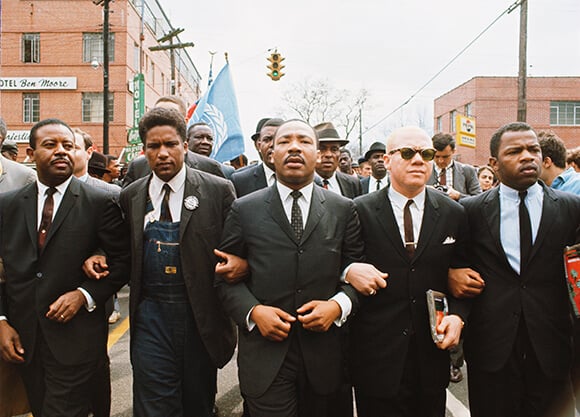
Honoring the man behind Dr. Martin Luther King Jr. Day
January 17, 2022

January 17, 2022

“Dr. King's legacy that he forged from the mid 1950s to his murder in 1968 is evident in the enduring movement he led for civil rights, voting rights, social justice and economic equality,” said Rich Hanley, associate professor of journalism. “The fact that these issues remain unresolved more than 50 years after his death reflects the depth of the opposition he confronted before his death and the tireless nature of his journey to see change occur in his short lifetime.”
King spoke to the everlasting universal themes of equality and social justice in the face of opposition that people witnessed in real time — not passed down through oral or written histories that tend to either exaggerate or dilute authentic heroic action, Hanley said.
“The evidence of the obstacles he confronted, the violence he faced, the size of the mountain he needed to scale could neither be downplayed, exaggerated, nor misinterpreted as mythological in nature,” he said.
King’s legacy has only strengthened in time, thanks to those who continue to share his message, Hanley said.
“He was very real as documented on news film, in photographs and in testimony from people who bore witness to the struggle,” he said. “America and the world saw a real person of great courage and fidelity to his journey battling formidable opposition in real time, on real streets, with in many cases against the full force of tradition and law.”
King was only 39 when he was gunned down in Memphis, Tennessee in 1968 — and yet accomplished so much in his short life.
“Dr. King remains the youngest person to receive the Nobel Peace Prize, which he earned at the age of 35,” Hanley said. “That reflects the maturity of judgment shaped by events that he experienced over his brief lifetime that deepened beyond his years the full nature of his calling to change the world as he saw it for the betterment for all. He emerged at the time when one generation was ceding its place to another.”
Hanley pointed to John F. Kennedy becoming president at 43, replacing Dwight D. Eisenhower in 1963. Kennedy, born in 1917, replaced Eisenhower, who was born in the previous century.
“Dr. King knew that he had to move quickly, that the window of generational change would be narrow and that he would be required to use the forceful energy of young adulthood in combination of his sense of the time to get things done. His ‘I Have a Dream Speech’ in 1963 exemplifies the urgency of the moment,” Hanley said.
In the years that have passed, his family has worked diligently to celebrate and promote the ideals for which he lived and died.
“Pop culture has a way of turning heroes into commodities, but the King family has erected a thicket of legal mechanisms around his name, likeness and images and historical footage to preserve the integrity of his life,” Hanley said. “That, however, can work against King's legacy because it restricts wide public access to materials that can be used as part of narratives that explore his life and lessons that can be drawn from it.”
Quinnipiac Today is your source for what's happening throughout #BobcatNation. Sign up for our weekly email newsletter to be among the first to know about news, events and members of our Bobcat family who are making a positive difference in our world.
Sign Up Now